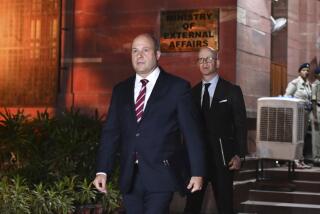Syria Retaliates by Expelling 3 British Envoys : Responds to London’s Ouster of 3 Diplomats Accused of Links to Terrorism
- Share via
LONDON — Less than 24 hours after Britain ordered three Syrian diplomats out of the country because of alleged terrorist activities, Syria on Sunday responded by expelling three British diplomats serving in Damascus. British officials here immediately condemned the move as “unjustified and regrettable.”
The expulsions, announced by Damascus radio and confirmed by the British Foreign Office, include the embassy’s defense attache, a first secretary and a vice consul.
Britain took action against the three Syrian envoys Saturday after police investigations linked them with an April 17 attempt to blow up an El Al Israel Airlines jumbo jet.
They have been given a week to leave Britain, the same length of time given to the British diplomats by Syria.
A Syrian Foreign Ministry announcement stated, “The Syrian retaliation is an answer to the British government’s expulsion of three diplomats serving with the Syrian Embassy in London without any objective justification.”
Although protesting the decision, the Foreign Office here said it plans no further action against Syria in the affair.
“We regard this as being quite unjustified and also regrettable,” a Foreign Office spokesman said, speaking of the Syrian action. “We’re not in the tit-for-tat game. We have expelled Syrians because they were allegedly involved in terrorist activity. I don’t see any further developments now.”
Last September, however, Britain did engage in such a diplomatic battle with Moscow, which included three retaliatory expulsion orders that eventually affected more than 60 diplomats, businessmen and journalists.
No Connection Found
The Foreign Office spokesman said it has no evidence that a fourth Syrian diplomat, who left for Damascus on Sunday, was connected with terrorist activities.
“His departure is pure coincidence,” the spokesman said.
London’s Sunday Times newspaper had identified the man, Georges Shiha, as a military intelligence expert who was leaving Britain hurriedly after Britain issued the initial expulsion orders. But Shiha said he was simply returning home at the conclusion of a four-year tour of duty at Syria’s London embassy.
On Sunday, Syria’s ambassador in London, Loutof Haydar, repeated that the three Syrians under expulsion orders were innocent.
“The Syrian Embassy in London has no knowledge of involvement in terrorist activity on British soil,” he told a British Broadcasting Corp. interviewer. “If there were any serious breach of diplomatic immunity, I am sure . . . that the English reaction would have been much stronger than it is now.”
London police reportedly linked the three Syrians to the El Al bomb plot at some point late last month, roughly two weeks after arresting a 31-year-old Palestinian, Nezar Hindawi, in connection with the incident.
The three were ordered to leave Britain after Syria refused to waive their diplomatic immunity, which would have left them open to possible prosecution.
Scotland Yard investigators rejected a Syrian offer to let police question the three men at the Syrian Embassy with their full diplomatic immunity in force.
Since evidence obtained under such conditions could not be used in court, police investigators decided against questioning the men, a Foreign Office spokesman explained.
Hindawi has been formally charged with murder conspiracy, and some intelligence reports have linked Syria to the bomb he is accused of placing in the hand luggage of his unsuspecting, pregnant girlfriend.
Moments Before Flight
The woman passed through all routine security checks before the bomb was discovered by a member of the El Al security staff moments before she was due to board the flight, bound for Tel Aviv with 388 people aboard.
Hindawi’s brother, 35 year-old Ahmed Nawaf Mansour Hasi, is being held by West Berlin police in connection with the April 5 bombing of a discotheque frequented by American GIs.
One U.S. soldier and a Turkish woman were killed in that blast, and there is reportedly evidence indicating that Syrian-backed groups may have played a role in the attack.
This weekend’s round of expulsions is likely to sour Anglo-Syrian relations at a time when Britain has become more active in the search for a formula to reduce of tensions in the Middle East.
Prime Minister Margaret Thatcher is scheduled to visit Israel, probably next month. After her trips to Egypt and Jordan last year, a delegation of moderate Palestine Liberation Organization members came to London last October for talks aimed at reviving a peace plan initially put forward by Jordan’s King Hussein.
However, last-minute differences in the wording of a previously agreed-on joint statement led to the collapse of the talks.
More to Read
Sign up for Essential California
The most important California stories and recommendations in your inbox every morning.
You may occasionally receive promotional content from the Los Angeles Times.













